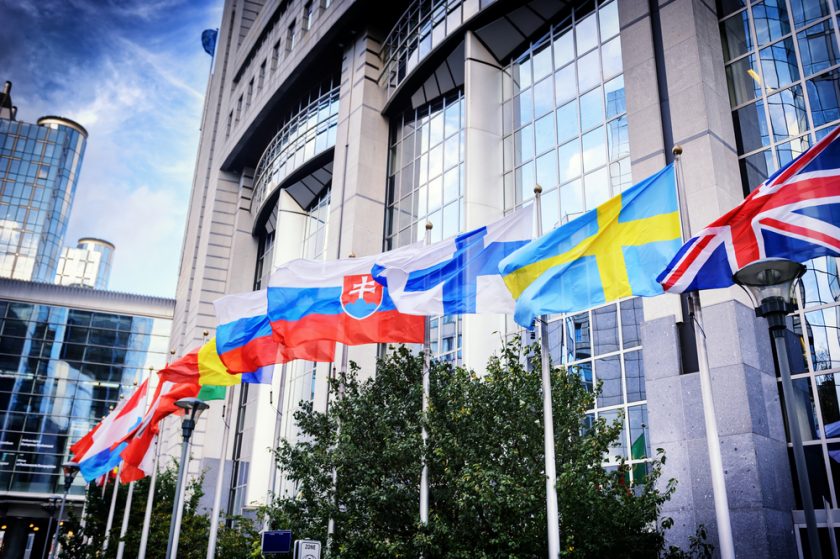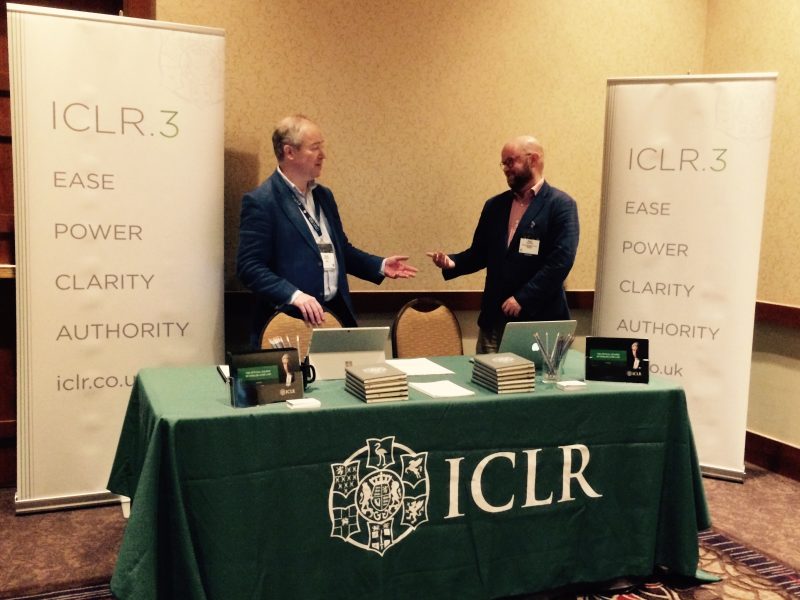Weekly Notes: legal news from ICLR — 23 October 2017
This week’s roundup of legal news and comment is less discursive than usual because we’re on the road, but it covers Brexit, legal services regulation, conference news and more. Brexit Still talking Prior to travelling to Brussels for last week’s European Council summit meeting, Theresa May sent an open letter to EU nationals living in
This week’s roundup of legal news and comment is less discursive than usual because we’re on the road, but it covers Brexit, legal services regulation, conference news and more.

Brexit
Still talking
Prior to travelling to Brussels for last week’s European Council summit meeting, Theresa May sent an open letter to EU nationals living in the UK on her commitment to protecting their status. Conor James McKinney on the Free Movement blog has set out what it says, and decoded what it actually means: Theresa May’s open letter: what she said and what she meant
At the summit itself, Brexit was one of the main items on the agenda, but not to the exclusion of other major threats to European welfare, such as North Korea and Iran. The Times’ Brexit Briefing described this cocktail of threats as an “axis of evil”. There was a picture of Theresa May sitting alone at a table confronting a row of pot plants, suggesting either that she had no one to play with or, on the other hand, that her EU counterparts were not really human.
Brexit summed up in just one picture by Theresa May in Brussels today pic.twitter.com/ahE4VELi5r
— Elliot Wagland (@elliotwagland) October 20, 2017
Though the image went viral, it seems it may have been cropped to exclude a number of human counterparts about to sit on the other side of the table.
The Guardian editorial noted that while the summit had not been the disaster for Theresa May that many had feared, little had actually been achieved in terms of progress on Brexit:
“The first phase of the article 50 negotiations has not made enough progress, especially on money. The phase one issues — rights, money and Ireland — will have to be re-examined in December. Disagreements and gulfs remain. There is no agreement on a transition after March 2019. Discussion of phase two, the future UK-EU relationship, remains on hold. Meanwhile, the clock ticks on.”
Politico provided 5 takeaways from the autumn EU leaders’ summit, including
“On Brexit, the EU27 voted quickly and with rock-solid unity to declare that there has not yet been “sufficient progress” in the talks, kicking a decision on moving to phase 2 until the next summit, in December. That much was expected. The summit, however, provided new and additional clarity that progress hinges mainly on the financial settlement.”
Back home, the loony (surely “more ardent”?) wing of the Brexit party revived calls for Britain to walk out with no deal, partly on the grounds that this couldn’t be worse than whatever stitch-up the 27 other EU nations might seek to impose and partly because the flagging talks reflected badly on British national pride and self-esteem and a confident gesture would restore the lion’s roar. There seemed to be general assumption that relying on WTO ground rules would be sufficient to prevent punitive tariffs on trade. Chris Morris, Reality Check correspondent for BBC News, explained What would ‘no deal’ look like?
The Independent reported that a poll it had commissioned showed that Three-quarters of the UK public say Brexit is going badly. On the other hand,
“Almost half also think that the no-deal scenario threatened by ministers would be “bad” for Britain, and reject outright the hard Brexit plan to abandon talks at Christmas if the EU does not allow progress, according to the poll.”
See also:
Obiter J on the Law and Lawyer’s blog, The reckless fantasy of Brexit.
LSE Brexit blog: Brexit has led to falling real wages in the UK
EU withdrawal bill
The number of amendments tabled to the European Union Withdrawal Bill is now so massive that the government is worried there might not be time to debate them all, as the sovereignty of Parliament (which is what Brexit is supposed to be all about) dictates. The Guardian reported that the eight days already set aside before Christmas would not be enough: Brexit plan ‘in paralysis’ with ministers set to delay EU withdrawal bill.
We last discussed the Bill in Weekly Notes on 9 October 2017 and its introduction in Weekly Notes on 17 July 2017.
Conference news
International Association of Law Libraries
The 36th annual course of the IALL takes place in Atlanta, Georgia, USA this week. Paul Magrath, Head of Product Development, and Paul Hastings, Account Manager, are attending the conference on behalf of ICLR as exhibitors and sponsors. We have blogged separately about this here.

Law via the Internet
The LVI Annual Conference 2017 took place at Rutgers Law School in Newark, New Jersey, USA last week. The theme of this year’s conference, from 19 to 21 October, was “Visualizing Progress”. Daniel Hoadley, Head of Marketing for ICLR, presented a paper on “Open access to case law”. We hope to publish this in due course.
Consultation
Alternative Dispute Resolution
The Civil Justice Council is inviting responses to a consultation, launched on 17 October 2017, on its comprehensive interim report on the existing role and potential future role of ADR (alternate dispute resolution) in civil justice in England and Wales.
Written submissions on the report should be submitted by Friday 15 December 2017 to civiljusticecouncil@judiciary.gsi.gov.uk.
See also, in Law Society Gazette, News focus: Will mediation become compulsory?
Regulation
BSB Handbook — new edition
A new edition of the Bar Standards Board’s Handbook will be published next month. It includes changes to the parental leave rules.
“The change to the parental leave rules will require all chambers to have a policy that allows any member who becomes the carer of a child to take parental leave. Though the precise details of such policies are for individual chambers to decide, the new rule mandates that flexible working arrangements be available to members during their parental leave. Both the BSB and the Bar Council will be producing additional guidance on this change, and chambers will have until November 2018 to update their policies.”
Legal Ombudsman report
The Office for Legal Complaints(OLC), which oversees the Legal Ombudsman(LeO), published its Annual Report and Accounts 2016–17. You can read the press release here. It says
“The report highlights that LeO is investing in a major programme of change to improve business processes and developing its staff through the Modernising LeO programme. Its work goes above and beyond complaints by feeding back to service providers through courses, guidance documents, Periscope videos and conferences.”
Legal Futures highlighted the fact that LeO’s Finances [are] finally in order but now performance needs to improve. However, it also mentioned that in respect of customer satisfaction the Ombudsman service more than met the target.
Some other interesting reads
Defendants on video — conveyor belt justice or a revolution in access? A new report by Penelope Gibbs from Transform Justice on the problems with video hearings and evidence-giving in criminal cases.
Magical sparkle powers — a sparkle too far? Post on the Suesspicious Minds blog about the limits (or lack of them) of the court’s inherent jurisdiction.
Flying under the Radar: Experiencing the Court of Protection Transparency Pilot as an academic researcher, guest post by Gillian Loomes on the Transparency Project blog.
“A very provocative broadside” — are women really destroying marriage? Guest post by Jo Edwards on the Transparency Project blog.
Sir Edward Heath: When duty doesn’t call. Article by Joshua Rozenberg on Law Society Gazette on the costly investigation of a dead politician for historic sex offence allegations mainly for the benefit of alleged victims.
Tweet of the week
marks the passing of Donald Raistrick, someone for whom all traditional law reporters, as well as law librarians, will have had tremendous respect, by reason of his essential reference work, the Index to Legal Citations and Abbreviations.
Sad to see @biall_uk announce that Donald Raistrick has died, I still use the Index to Legal Citations regularly, so useful
— SLLG (@ScotLawLibs) October 17, 2017
That’s it for now. Thanks for all your tweets, many of which provide source material for which we are very grateful. We’ll try to plug all our borrowings. If you like the blog, you can sign up below for email alerts.
This post was written by Paul Magrath, ICLR blog editor, and does not necessarily represent the views of ICLR as an organisation.